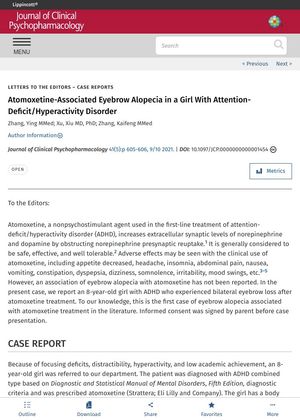TLDR An 8-year-old girl's eyebrow hair loss was linked to atomoxetine for ADHD but grew back after stopping the medication.
An 8-year-old girl with Attention-Deficit/Hyperactivity Disorder (ADHD) experienced bilateral eyebrow loss after treatment with atomoxetine, a nonpsychostimulant agent commonly used for ADHD. This is the first reported case of eyebrow alopecia associated with atomoxetine treatment. The girl had no history of alopecia, dermatological disease, or specific drug reactions, and was not exposed to other medications, heavy metals, toxins, or stressors while taking atomoxetine. After discontinuing the medication, her eyebrows returned to their normal state after 36 days without any other medications or dietary supplements. Atomoxetine was reintroduced after 50 days due to ADHD symptoms, but no signs of eyebrow alopecia were observed. The exact mechanisms of eyebrow alopecia and drug tolerance are still unknown, but adverse effects were noted to be transient, occurring mainly early in atomoxetine treatment and then declining. Clinicians should be aware that eyebrow alopecia is a possible but very rare adverse effect of atomoxetine treatment.
8 citations
,
August 2016 in “Expert opinion on pharmacotherapy” New, safer treatments for children's hair disorders are needed, and better evaluation methods are recommended.
 36 citations
,
January 2012 in “International Journal of Trichology”
36 citations
,
January 2012 in “International Journal of Trichology” Losing eyelashes or eyebrows can be a sign of many different health problems and needs a careful approach to treat effectively.
 85 citations
,
April 2007 in “Dermatologic Clinics”
85 citations
,
April 2007 in “Dermatologic Clinics” Some drugs can cause hair loss, change hair color and shape, or increase hair growth, and treatment may involve stopping the drug or using specific hair growth treatments.
 63 citations
,
March 2000 in “Annals of clinical psychiatry”
63 citations
,
March 2000 in “Annals of clinical psychiatry” Some psychiatric medications can cause hair loss, but it usually grows back after adjusting the medication.
79 citations
,
January 2000 in “Annals of Clinical Psychiatry” Some psychiatric medications can cause hair loss, but stopping or reducing the dose usually reverses it.
 7 citations
,
May 2013 in “Optometry and vision science”
7 citations
,
May 2013 in “Optometry and vision science” Bimatoprost can help regrow eyelashes in people with trichotillomania.
119 citations
,
February 2009 in “Neuroscience & Biobehavioral Reviews” Trichotillomania involves hair pulling and can be treated with therapy and medication.
2 citations
,
January 2018 in “Indian Journal of Psychiatry/Indian journal of psychiatry” Methylphenidate can cause hair loss, which stops when the drug is discontinued.
 13 citations
,
October 2010 in “Pharmacogenomics”
13 citations
,
October 2010 in “Pharmacogenomics” Researchers found that most genes affecting drug responses are not fully covered by commercial SNP chips, suggesting the need for more comprehensive tools to optimize drug selection based on genetics.
 8 citations
,
February 2017 in “Clinical Drug Investigation”
8 citations
,
February 2017 in “Clinical Drug Investigation” Finasteride can cause sexual dysfunction and depression, which may persist and require hormonal treatment.






